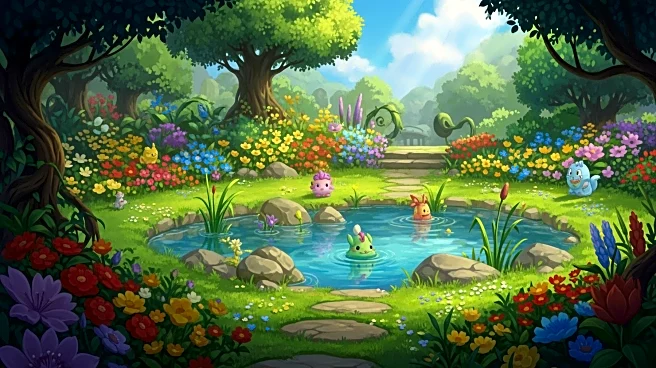What's Happening?
Nintendo has announced the release of Pokemon Pokopia, a new game set to launch on March 5, 2026, exclusively for the Nintendo Switch 2. Unlike traditional Pokemon games, Pokopia focuses on life simulation
rather than battles. Players will guide Pokemon, including Ditto, Pikachu, Bulbasaur, Squirtle, and Charmander, in a harmonious environment tailored to their needs. The game allows players to build homes, grow crops, and create a paradise for Pokemon without human intervention in their destinies. Developed by Omega Force, known for their work on Dynasty Warriors and collaborations with Nintendo, Pokopia promises a unique gameplay experience akin to Minecraft and Animal Crossing.
Why It's Important?
Pokemon Pokopia represents a significant shift in the Pokemon franchise, moving away from combat-centric gameplay to focus on life simulation and community building. This change could attract a broader audience, including those interested in non-violent gaming experiences. The exclusive release on Nintendo Switch 2 may drive sales for the new console, as fans upgrade to access the game. Additionally, the involvement of Omega Force, a reputable developer, suggests high-quality production values and potential for future expansions. This development may influence other game franchises to explore non-combat themes, impacting the gaming industry’s approach to content creation.
What's Next?
With the release date set for March 2026, Nintendo is expected to ramp up marketing efforts, including a new trailer scheduled for November 13, 2025. Fans and industry analysts will be watching for additional gameplay details and potential post-launch content. The success of Pokemon Pokopia could lead to further non-combat titles within the franchise, potentially expanding the Pokemon universe in new directions. Stakeholders, including Nintendo and Omega Force, may explore collaborations for similar projects, influencing future game development strategies.
Beyond the Headlines
Pokemon Pokopia’s focus on peaceful coexistence among Pokemon may reflect broader cultural shifts towards non-violent entertainment and community-focused narratives. This could encourage discussions on the ethical implications of traditional combat games and inspire developers to create more inclusive and diverse gaming experiences. The game’s emphasis on environmental customization and care for Pokemon might also resonate with themes of sustainability and conservation, aligning with global movements towards ecological awareness.








